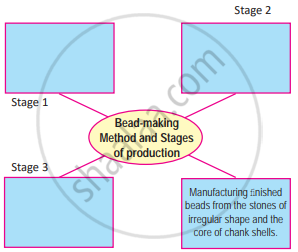Advertisements
Chapters
2: First Cities of India
3: Chalcolithic Villages in India
4: Vedic Period
5: Janapadas and Republics
6: Second Urbanisation in India
7: India and Iran (Persia)
8: India during Mauryan period
9: Post Mauryan India
10: Changing Times
11: Kingdoms in South India
12: India, Nations in the northwest of the Indian Subcontinent and China
13: India, Shri Lanka and Southeast Asia
14: Delhi Sultanate, Vijayanagar and Bahamani Kingdom
15: India during Mughal period
16: Swarajya to Empire (Maratha period)
![Balbharati solutions for History [English] 11 Standard Maharashtra State Board chapter 1 - First Farmers Balbharati solutions for History [English] 11 Standard Maharashtra State Board chapter 1 - First Farmers - Shaalaa.com](/images/history-english-11-standard-maharashtra-state-board_6:3dcabbfec4ff4e6682b9c23b086657c1.jpg)
Advertisements
Solutions for Chapter 1: First Farmers
Below listed, you can find solutions for Chapter 1 of Maharashtra State Board Balbharati for History [English] 11 Standard Maharashtra State Board.
Balbharati solutions for History [English] 11 Standard Maharashtra State Board 1 First Farmers Exercise [Pages 8 - 9]
Choose the correct alternative and write the complete sentence.
‘Yellow River’ is the English translation of the Chinese name ______.
Kemet
Mother
Sorrow
Huang He
The Australian archaeologist ______ coined the term ‘Neolithic Revolution’.
Gorden Willey
Gordon Childe
Herodotus
Collingwood
Choose the correct alternative and write the complete sentence.
The neolithic people at Gilgal had systematically planted ______ trees.
Guava
Sapodilla
Fig
Indian blackberry
Choose the correct alternative and write the complete sentence.
______ in the Shirur taluka of Pune district, is an important site of the village of Chalcolithic farmers in Maharashtra.
Saradwadi
Ranjangaon
Pabal
Inamgaon
Find the incorrect pair from set B and write the correct ones.
Set ‘A’ Set ‘B’ The valley of Tigris and Euphrates Mesopotamia Set ‘A’ Set ‘B’ The valley of Nile Iran Set ‘A’ Set ‘B’ The valley of Huang He China Set ‘A’ Set ‘B’ The valley of Sindhu (Indus) and Saraswati Indian subcontinent
Complete the concept map.

Explain the following statement with reasons.
The camps of Mesolithic people developed into the first settled villages of neolithic people in Mesopotamia.
Explain the following statement with reasons.
‘Huang He’ river is considered to be the mother of the Chinese culture.
Explain the following statement with reasons.
In the latter half of the neolithic age, pottery-making had become an art that required special skills.
State your opinion.
There were radical changes in the way of human life during the neolithic age.
State your opinion.
The neolithic people invented wheel and the technology they had developed so far, underwent a revolution.
Observe the map and answer the following question based on it.

What is the name of the sea at the north of the African continent?
Observe the map and answer the following question based on it.

In which continent did the Harappan civilisation originate?
Observe the map and answer the following question based on it.

What is the name of the ocean at the south of India?
Write short notes.
Neolithic ‘Jericho’
Write short notes.
‘Holocene’ epoch
Answer the following question in detail.
Write in detail about the ‘first farmers’ and beginning of agriculture in India.
Answer the following question in detail.
What knowledge was essential for the neolithic people to make pottery?
Answer the following question in detail.
Write about the trade and transport in the neolithic age.
Answer the following question in detail.
Write about the beginning of urbanisation in the neolithic age.
Solutions for 1: First Farmers
![Balbharati solutions for History [English] 11 Standard Maharashtra State Board chapter 1 - First Farmers Balbharati solutions for History [English] 11 Standard Maharashtra State Board chapter 1 - First Farmers - Shaalaa.com](/images/history-english-11-standard-maharashtra-state-board_6:3dcabbfec4ff4e6682b9c23b086657c1.jpg)
Balbharati solutions for History [English] 11 Standard Maharashtra State Board chapter 1 - First Farmers
Shaalaa.com has the Maharashtra State Board Mathematics History [English] 11 Standard Maharashtra State Board Maharashtra State Board solutions in a manner that help students grasp basic concepts better and faster. The detailed, step-by-step solutions will help you understand the concepts better and clarify any confusion. Balbharati solutions for Mathematics History [English] 11 Standard Maharashtra State Board Maharashtra State Board 1 (First Farmers) include all questions with answers and detailed explanations. This will clear students' doubts about questions and improve their application skills while preparing for board exams.
Further, we at Shaalaa.com provide such solutions so students can prepare for written exams. Balbharati textbook solutions can be a core help for self-study and provide excellent self-help guidance for students.
Concepts covered in History [English] 11 Standard Maharashtra State Board chapter 1 First Farmers are River Valley Civilisations, Beginning of Cultivation: Agricultural Production, The First Farmers in India, Agricultural Settlements: Organisation and Administration, Trade and Transport, Beginning of Urbanisation.
Using Balbharati History [English] 11 Standard Maharashtra State Board solutions First Farmers exercise by students is an easy way to prepare for the exams, as they involve solutions arranged chapter-wise and also page-wise. The questions involved in Balbharati Solutions are essential questions that can be asked in the final exam. Maximum Maharashtra State Board History [English] 11 Standard Maharashtra State Board students prefer Balbharati Textbook Solutions to score more in exams.
Get the free view of Chapter 1, First Farmers History [English] 11 Standard Maharashtra State Board additional questions for Mathematics History [English] 11 Standard Maharashtra State Board Maharashtra State Board, and you can use Shaalaa.com to keep it handy for your exam preparation.
